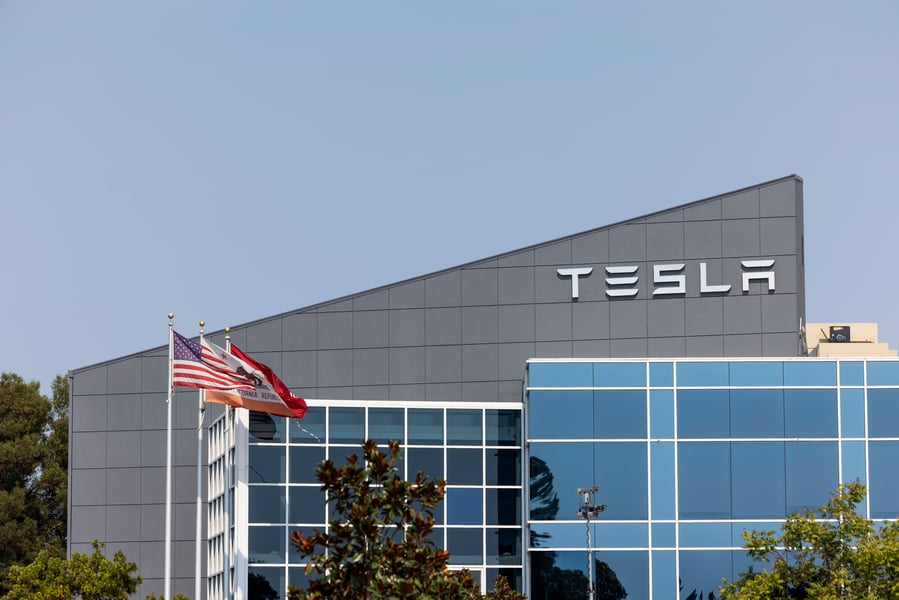

by Esha Dey
Tesla Inc.’s reveal of its much-hyped self-driving car last week left investors underwhelmed and sent shares plunging. The disappointment also left the Street questioning the shares’ premium valuation.
The so-called robotaxi is a dazzling promise that has been crucial to keeping Tesla’s stock at lofty heights. It’s also a key part of Elon Musk’s vision for the artificial-intelligence driven future of his company. But with numerous questions remaining about technical details of the vehicles and when they will be available, the shares — trading at 75 times forward earnings — are looking expensive to some.
“This is still a carrot on a string,” said Steve Sosnick, chief strategist at Interactive Brokers. “How many new investors will be willing to buy this expensive stock when the core auto business is slow and the company did not show how it will bring the rapid growth in the future?”
Tesla investors have a lot riding on the success of autonomous vehicles. Bernstein analyst Toni Sacconaghi estimates that Tesla’s core electric-vehicle business is likely worth less than $200 billion, suggesting its market capitalization reflects a value of about $600 billion for other endeavors, such as the robotaxi and the Optimus humanoid robot.
The shares are down 7.5% since the splashy October 10 event, but that’s barely dented the premium. Tesla is by far the most expensive stock in the Magnificent 7, and dwarfs the mid-single-digit multiples of traditional carmakers like General Motors Co. and Ford Motor Co. It’s also much pricier than the Nasdaq 100’s multiple of 26 times forward earnings.
“What worries me the most about Tesla’s valuation is how do you grow into a 75-times price-to-earnings multiple,” said Interactive Brokers’ Sosnick. “The only way you can is if you have a world-changing technology, which they once did, but the current valuation requires a similarly major leap forward.”
Last week’s glitzy event failed to inspire confidence that such a major leap is coming anytime soon. In the meantime, slowing demand for electric vehicles around the world and rising competition are hitting its sales and profits.
“Tesla’s robotaxi event was long on vision, and short on immediate deliverables or incremental revenue drivers,” Bernstein’s Sacconaghi wrote in a note. The company showed prototypes of a two-door sedan called the Cybercab, a concept van and an updated version of Optimus, but lacked key details that investors had wanted to see. Those included how Tesla will move from selling advanced driver-assistance features to fully autonomous vehicles, its path to regulatory approval, and evidence that it is comfortably ahead of rivals like Alphabet Inc.’s Waymo.
There were other kinks, too. The robotaxi will “probably” go into production only in 2026. And Bloomberg reported earlier this week humans remotely controlled some capabilities of the robots at the event.
Sacconaghi noted that Tesla continues to lag well behind competitors when it comes to self-driving technology, and expressed concern that even if it becomes the first to achieve full self-driving, rivals will likely follow soon.
“We do not believe the event provided sufficient detail to assuage our concerns, and believe the same is likely true for many investors,” he wrote.
To be sure, there are some that are still willing to give Tesla the benefit of the doubt.
“First and foremost, Tesla is a Musk company,” said Nicholas Colas, co-founder at DataTrek Research. “As long as Musk is alive and generating ideas and having success in other businesses, people will say if this guy can have a rocket return to a pinpoint, of course he can solve self-driving.”
Still, after a 70% rally ahead of the robotaxi event, things are looking challenging for Tesla shares.
The next catalyst to watch is third-quarter results, due next week, when analysts expect the company to report a 10% decline in profits from year-ago levels.
“In the near-term, what would worry us will be any substantial weakness in car sales, which is still the bread and butter for Tesla,” said Brian Mulberry, client portfolio manager at Zacks Investment Management.
Nvidia Corp. shares are roaring back after the chipmaker’s chief executive officer Jensen Huang successfully calmed investor concerns about product delays and its long-term growth prospects. The company’s market capitalization of around $3.36 trillion is inching closer to Apple Inc.’s roughly $3.53 trillion as the battle for the world’s most valuable company heats up again.
Top Tech Stories
Earnings Due Friday
Copyright Bloomberg News

Relationships are key to our business but advisors are often slow to engage in specific activities designed to foster them.

Whichever path you go down, act now while you're still in control.

Pro-bitcoin professionals, however, say the cryptocurrency has ushered in change.

“LPL has evolved significantly over the last decade and still wants to scale up,” says one industry executive.

Survey findings from the Nationwide Retirement Institute offers pearls of planning wisdom from 60- to 65-year-olds, as well as insights into concerns.
Streamline your outreach with Aidentified's AI-driven solutions
This season’s market volatility: Positioning for rate relief, income growth and the AI rebound
